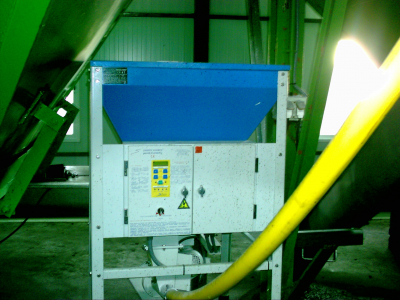Talc in oil production
Talc addition was once considered taboo, but nowadays even the scientific world is starting to investigate its use and potential benefits. There is something we want to know: does talc affect the yield and quality of extra virgin olive oil? Professor Francesco Caponio, together with his colleagues from the University of Bari, is trying to answer this question. What happens when physical extraction adjuvants are added to olive paste during malaxation?

This is the second in our series of articles focusing the latest scientific findings in the field of olive oil. After examining the topic of emulsions with Professor Paola Pitta and Dr. Carla Di Mattia from the University of Teramo (The best oil for mayonnaise), we will now illustrate the most recent investigations carried out by Professor Francesco Caponio and fellow researchers from the Aldo Moro University in Bari.
Amongst the many topics investigated by Professor Caponio in the field of olive oil (as witnessed by the countless papers of which he is an author, and listed at the end of this article) some of the most recent and interesting ones focus on the use of technological adjuvants.
The first of the two papers, “Has the use of talc an effect on yield and extra virgin olive oil quality?”was published in 2016 in the Journal of the Science of Food and Agriculture (Volume 96, pages 3292–3299). Written by Francesco Caponio, Giacomo Squeo, Graziana Difonzo, Antonella Pasqualone, Carmine Summo and Vito Michele Paradiso, it reviews all the latest findings on the use of talc in olive oil production. Below is a summary.
The maximization of both extraction yield and extra virgin olive oil quality during olive processing is the main objective of the olive oil industry. As regards extraction yield, it can be improved by both acting on time/temperature of malaxation and using physical coadjuvants. It is well known that, generally, increasing temperature of malaxation gives an increase in oil extraction yield due to a reduction in oily phase viscosity; however, high malaxation temperature can compromise the nutritional and health values of extra virgin olive oil, leading to undesirable effects such as accelerated oxidative process and loss of volatile compounds responsible for oil flavour and fragrance.
The addition of physical coadjuvants in olive oil processing during the malaxation phase, which is not forbidden by the laws in force, is known to promote the breakdown of oil/water emulsions and consequently make oil extraction easier, thus increasing yields. Among the most popular physical adjuvants there is micronized natural talc, which is often used when processing Spanish and Italian olive cultivars. As regards the quality of the resulting extra virgin oil, the literature suggests that while the addition of talc increases the oil yield, no clear trend was observed as regards its chemical, nutritional and sensory characteristics. Although an increase in oil stability was reported, no effect of talc was found on the evolution of virgin olive oil quality indices during storage.
Please click HERE to be redirected to the magazine and purchase the document
The second paper, “Talc effect on the volatiles of virgin olive oil during storage” was also published in 2016, but this time in an influential Italian publication, i.e. the Italian Journal of Food Science, edited by Chiriotti Editori (Volume 28, pages 705–715). Written by Francesco Caponio, Giacomo Squeo, Carmine Summo, Vito M. Paradiso and Antonella Pasqualone, it reports the results of an investigation carried out on three olive batches, each weighing approximately 2000 kg. Each batch was then divided into three groups and processed either in the absence of adjuvants (control sample), or with the addition of 1% or 2% micronized talc. The results obtained indicate that the use of talc did not significantly affect the volatile profile of either fresh or stored extra virgin olive oil. Minor changes in the composition of the volatile compounds were only observed when talc was added at levels greater than 2%.
Please click HERE to be redirected to the magazine and view the document
 Professor Caponio, can you tell us where you got the idea for this line of research, and who will presumably benefit from it?
Professor Caponio, can you tell us where you got the idea for this line of research, and who will presumably benefit from it?
As you can see from the summaries, these papers report some of our latest findings on the addition of physical adjuvants (micronized talc and calcium carbonate) to olive paste, which, as we all know, is considered hard to process. These investigations are part of a much greater research programmed aimed at increasing olive oil yields and defining the best settings for oil presses and decanters, as well as reducing energy consumption. The overall results will be of practical use for millers and technicians alike.
The opening picture shows a pump for adding talc to the malaxer
To comment you have to register
If you're already registered you can click here to access your account
or click here to create a new account


Comment this news